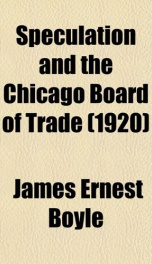speculation and the chicago board of trade

Purchase of this book includes free trial access to www.million-books.com where you can read more than a million books for free. This is an OCR edition with typos. Excerpt from book: IV THE CHICAGO BOARD OF TRADE Viewed As A Piece Of Market Machinery: Operation And Functions: Sixty Years Of Activity A Continuous Market.When the World War began in 1914, the commercial and financial shock was so terrific that all the world's stock exchanges closed their doors. The Directors of the Chicago Board of Trade paused for a moment and considered closing the Board, but decided against it. So the Board has a record of being open continuously, without a break, on every business day since it was incorporated. In other words, in any hour of any business day, in war or in peace, in prosperity or in panic, grain could be sold on the Chicago Board of Trade at a market value which was open and known to all men. What is the value of a continuous market to the man who has something to sell? It is impossible to state it in definite terms. The man who has been called on suddenly to sell a team of horses or a house and lot or a farmthings for which there are no organized exchanges can doubtless appreciate both the promptness and the definiteness of organized exchange prices. A Picture of One Day's Trading.A cross-section of the Board of Trade market at work would present a true picture of its various related activities. The writer made a study of this kind, selecting a day in August, when the movement of wheat and oats to market was extra heavy, but the movement of corn was extra light, thus getting a fair average day's business. Before the details of this study are given, it is well to state in brief outline what actually takes place on the trading floor. Grain is sold in three ways, namely, (1) cash grain: (2) To arrive grain: (3) Future delivery, or grain "futures." The cash grain is in cars in the switching district of .Chicago: it has been inspected by the State ...
Info about the book
Author:
Series:
Unknown
ASIN:
B007O9P88O
Rating:
2.5/5 (5)Your rating:
0/5
Languge:
English
Users who have this book
Users who want this book
What readers are saying
What do you think? Write your own comment on this book!
write a commentif you like speculation and the chicago board of trade try:
Other books by this author
Do you want to read a book that interests you? It’s EASY!
Create an account and send a request for reading to other users on the Webpage of the book!

